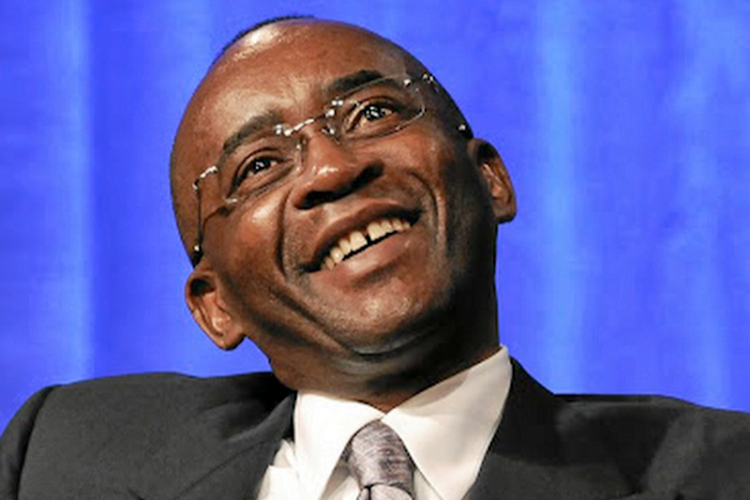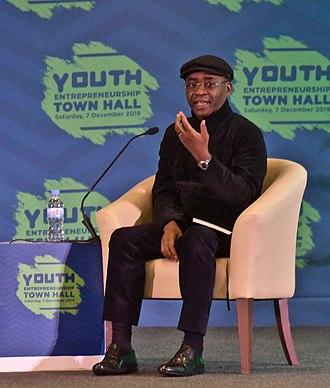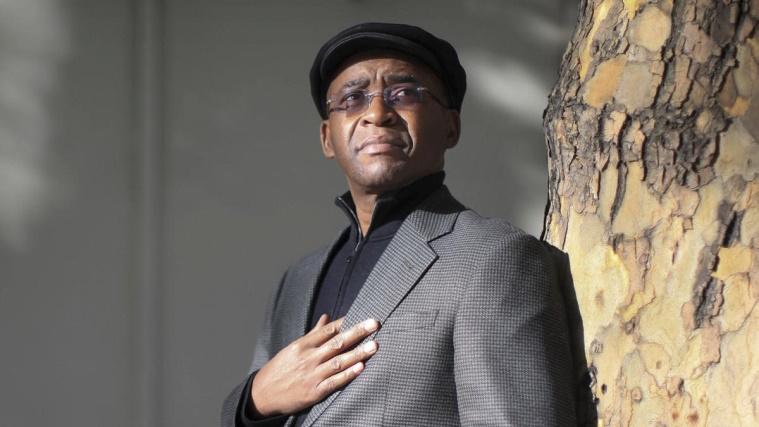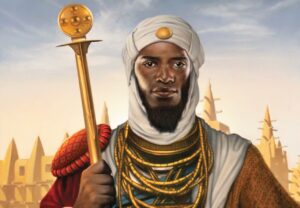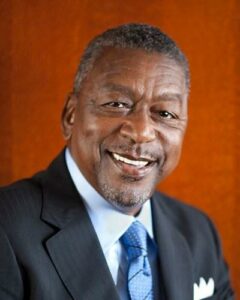Masiyiwa has provided scholarships to more than 250,000 young Africans over the past 20 years through his family foundation. He supports more than 40,000 orphans with educational initiatives and sponsors students at universities in America, the United Kingdom, and China.
1961
Southern Rhodesia, contemporary Zimbabwe
Zimbabwean
1968 – the family leaves Rhodesia and moves to Kitwe, Zambia
1973 – Strive is sent to Scotland to finish his secondary education
1978 – travels back to Rhodesia intending to join the military but changes his mind
1983 – earned a degree in electrical engineering from University of Wales
1984 – returned to Zimbabwe hoping to aid the country’s recovery following the end of the Rhodesian Bush War
1998 – Masiyiwa listed Econet Wireless Zimbabwe in on the local stock exchange
2000 – fleeing persecution from the local authorities, Masiyiwa left Zimbabwe, never to return
2015 – Forbes Magazine named Masiyiwa in the 10 Most Powerful Men in Africa
2020 – Masiyiwa was named by Bloomberg as one of the 50 world’s most influential people
2021 – Masiyiwa was named by Fortune Magazine on the list of the World’s 50 Greatest Leaders
In 1968 his family left Rhodesia after Prime Minister Ian Smith declared a Unilateral Declaration of Independence (UDI) from the United Kingdom. He was aged seven. The family settled in Kitwe, a city in north central Zambia known for its copper mines and it was here that he attended primary school before completing his secondary education in Scotland. Masiyiwa’s mother was an entrepreneur and by the time he was 12 years old, his parents could afford to provide him with a coveted private European education.
Masiyiwa’s international appointments and board memberships over the years include:
Unilever (board member), Netflix (board member), Bill & Melinda Gates Foundation (trustee), the National Geographic Society (trustee), Bank of America (global board member), Prince of Wales Trust (trustee), UN Commission on Adaptation (Commissioner), Generation Africa (co-founder), Pathways for Prosperity Commission on Technology and Inclusive Development (co-chair), The Rockefeller Foundation (former board member), US Council on Foreign Relations (Global Advisory Board), the Asia Society (board member), Stanford University (Global Advisory Board), the Africa Progress Panel, Alliance for a Green Revolution in Africa (Chair, now Chair Emeritus), The Micronutrient Initiative of Canada (former board member), Grow Africa, the African Union’s Ebola Fund (co-founder), Morehouse College, the African Academy of Sciences (Honorary Fellow) and the Pan African Strategic Institute.
Masiyiwa is the only African member of the United States Holocaust Memorial Museum’s Committee on Conscience. Masiyiwa also served on two UN Advisory Panels
Leadership and international accolades
In 2011, The Times of London named him one of the 25 Leaders of Africa’s Renaissance Award.
In 2014, Fortune Magazine named Masiyiwa one of the 50 most influential business leaders in the world, and he was cited as one of the Top 100 most influential Africans by New African magazine.
In September 2014, the Chair of the African Union (AU), Nkosazana Dlamini-Zuma, asked Masiyiwa to help mobilise resources for Africa’s response to the Ebola outbreak. This was the first time The AU had asked a business leader to undertake such a role. Masiyiwa, with the help of other leaders, set up the first ever Pan-African fund-raising campaign known as #AfricaAgainstEbola Solidarity Fund.
The fund has raised millions of US dollars from the public using SMS donations, with contributions coming from many African countries. The donations enabled The AU to deploy the largest known contingency of African healthcare workers to combat the spread of the deadly pandemic.
In 2015, Forbes Magazine named Masiyiwa in the 10 Most Powerful Men in Africa list for 2015, and the International Rescue Committee (IRC) awarded Masiyiwa the Freedom Award. The award is given annually to an individual who makes an extraordinary contribution towards supporting refugees and championing the causes of liberty, individual freedom, and dignity.
In 2019, he was awarded the Norman E Borlaug World Food Prize Medallion and named one of the 100 Most Influential Africans by New African magazine. In 2020, he was named a JA Worldwide Global Business Hall of Fame Laureate.
In December 2020 Masiyiwa was named by Bloomberg as one of the world’s 50 most influential people. He was also included in the list as one of the 100 Most Influential Africans of 2020 by the New African Magazine, and in Mail & Guardian’s 100 Africans of the year for 2020. In May 2021, Masiyiwa was named by Fortune Magazine on the list of the World’s 50 Greatest Leaders.
Business career and interests
Masiyiwa returned to his native Zimbabwe in 1984 after a 17 year absence. After working briefly as a telecoms’ engineer for the state-owned telephone company, he quit his job and set up his own company with the equivalent of US$75. He built a large electrical engineering business. The emergence of mobile cellular telephony led him to diversify into telecoms, but he soon ran into major problems when the Zimbabwean government of Robert Mugabe refused to give him a license to operate his business, known as Econet Wireless.
Masiyiwa appealed to the Constitutional Court of Zimbabwe, on the basis that the refusal constituted a violation of freedom of expression. The Zimbabwean court ruled in his favour after a fiveyear legal battle which took him to the brink of bankruptcy. The ruling, which led to the removal of the state monopoly in telecommunications, is regarded as one of the key milestones in opening the African telecommunications sector to private capital. The company’s first cellphone subscriber was connected to the new network in 1998.
Masiyiwa listed Econet Wireless Zimbabwe in July 1998 on the local stock exchange as a gesture of thanks to reward the thousands of ordinary people who supported him during his long legal battles against the Zimbabwean government. Today, Econet Wireless Zimbabwe has gone on to become a major business.
In March 2000, fleeing persecution from the local authorities, Masiyiwa left Zimbabwe, and moved first to South Africa, where he founded the Econet Wireless Group.
His main interest remained in telecoms. The company he created is known to have operations and investments in more than 20 countries, including the United Kingdom, US, Latin America, and New Zealand, United Arab Emirates, and China.
After more than ten years in South Africa, Masiyiwa moved to London; however, he still retains significant business interests in South Africa.
Econet Global
Econet Global (Econet) is a privately held international technology group with business operations and investments in more than 20 countries in Africa, Latin America, The United Kingdom, Europe, China, United Arab Emirates (UAE), and New Zealand.
Strive Masiyiwa owns over 50% of publicly traded Econet Wireless Zimbabwe.
Other activities of Econet include enterprise networks, fintech and financial services, and renewable energy.
He is married to Tsitsi, they have six children, and live in London, England. They also have apartments in New York City.
In 2021, Masiyiwa became the first Black billionaire to enter the Sunday Times Rich List with a net worth of £1.087 billion.
He has used his own family fortune to build one of the largest support programmes for educating orphans in Africa. At any given time, his family foundations support and educate more than 40,000 children. Masiyiwa is also a member of the Bill Gates and Warren Buffett initiative known as the Giving Pledge.
Masiyiwa is also involved in supporting a diverse range of health issues including campaigns against HIV/AIDS, Cervical Cancer, malnutrition, EBOLA, and more recently, COVID-19. He is an avid environmentalist and together with Sir Richard Branson founded the environmental group, the Carbon War Room.
He took over the Chairmanship of AGRA from former UN Secretary General Kofi Annan, This is an organisation that supports Africa’s smallholder farmers. In 2019 he stepped down from AGRA and now serves as Chairman Emeritus. In 2013, he was appointed co-chair of Grow Africa, the investment forum for Africa’s agriculture, which has helped mobilise over US$15 billion in investments for African agriculture.
Upon the cholera outbreak in Zimbabwe in 2019, Strive Masiyiwa donated US$10m to fight against the disease. Moreover, he pledged US$60m to be used to build resilience against the disease.
In May 2020, he was appointed by South African President and African Union Chair Cyril Ramaphosa to serve as a Special Envoy to the African Union for COVID response.
He and his wifehave pledged $100m to establish a fund to invest in rural entrepreneurs in his home country. The two also started a non-profit organisation, Higherlife Foundation, which empowers disadvantaged children through education and creating opportunities for highly talented young people
In January 2020 he paid for Zimbabwe’s doctors to return to work after they struck to get paid. Masiyiwa will pay each doctor a subsistence allowance of about $300 (£230) and provide them with transport to work, through a fund he set up. Most of the doctors on strike were earning less than $100 a month.
Strive Masiyiwa is very supportive of entrepreneurs and start-ups and has created employment for many through his business interests.
Meet ‘Bill Gates of Africa’ Strive Masiyiwa: the billionaire and philanthropist pioneered telecoms in his native Zimbabwe and owns multimillion-dollar properties | South China Morning Post (scmp.com)
Strive Masiyiwa – Wikipedia
About Strive Masiyiwa | Founder and Executive Chairman (cassavatechnologies.com)
Strive Masiyiwa 1961— Biography – Education and early career, The start of econet (referenceforbusiness.com)
Strive Masiyiwa net worth — Sunday Times Rich List 2021 | The Sunday Times (thetimes.co.uk)
Strive Masiyiwa (forbes.com)
Strive Masiyiwa | Unilever
